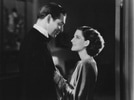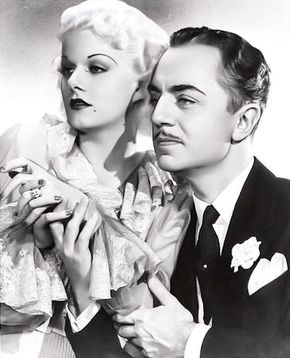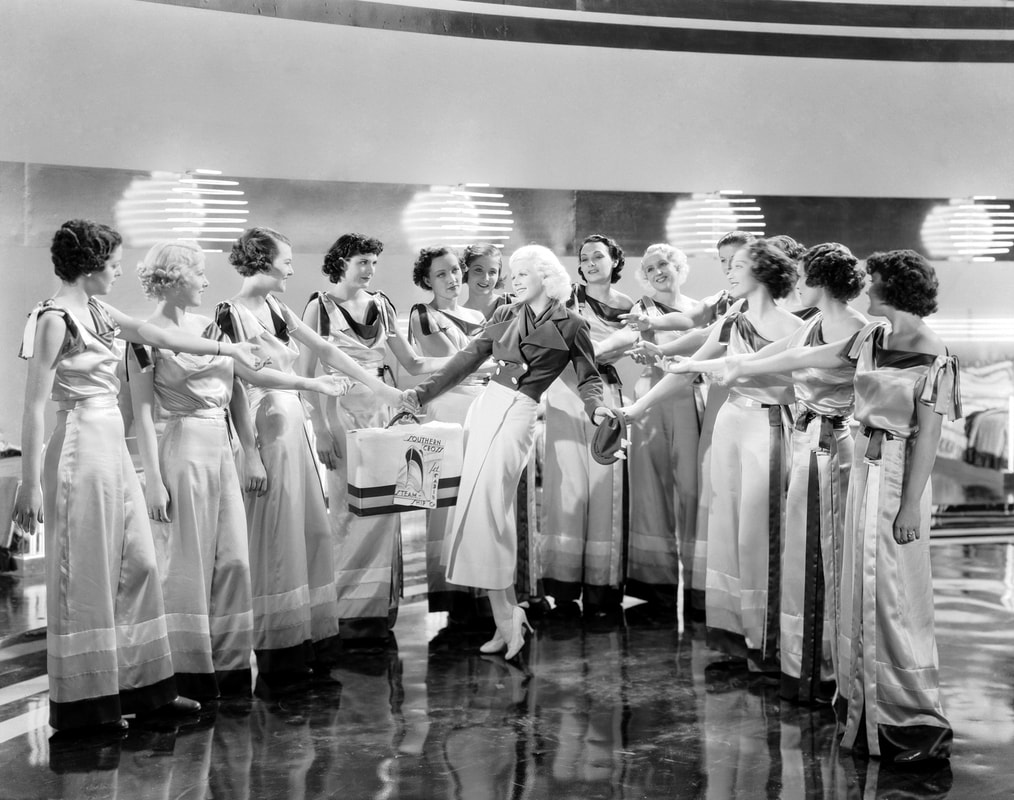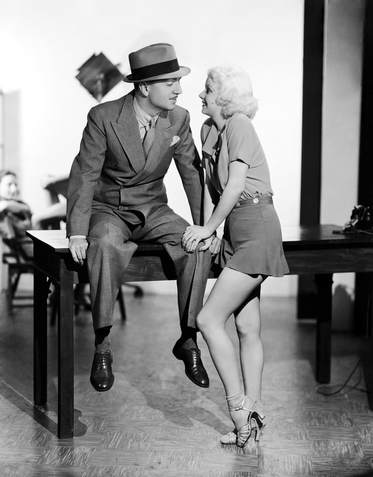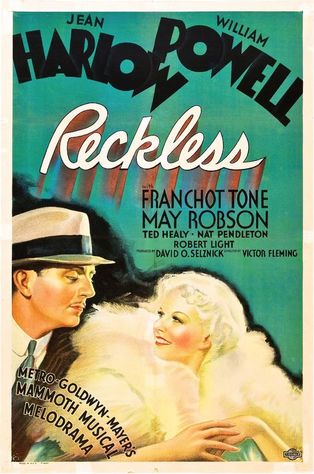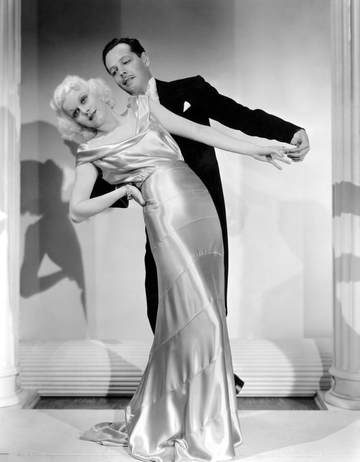Plot:
Mona Leslie (Harlow) is a musical performer who is seduced & impetuously marries rich playboy Bob Harrison (Tone). The morning after he begins to regret his decision, no more so than when he runs into his socialite fiancée Jo (Russell) at a country side fox hunt. His family also frowns on the marriage, which only furthers his depression. Mona does feel that she loves Bob, but she’s also chummy with her agent/booker Ned Riley (Powell), a man about town, who just can’t admit his feelings for Mona. When Bob kills himself in Ned’s hotel suite Mona is a suspect and is put in jail. Although she is eventually exonerated by the coroner, the prosecutor & public opinion have no trouble holding her morally responsible.
Months later she gives birth to a son, which reignites the tabloids to go after Mona, as does the family. When Mona offers to give up Bob’s money his father agrees to relinquish claims on the child. Mona then decides she will raise the child her way & support them both by returning to the stage, but with nationwide boycotts threatened only Ned will finance a how; a secret he keeps from Mona until right before opening night. When the blue blood protesters begin jeering her opening night performance Mona stops her song to at once chastise them and ask for a modicum of respect. When she exits the stage Ned finally professes his love for her as the movie fades!
Mona Leslie (Harlow) is a musical performer who is seduced & impetuously marries rich playboy Bob Harrison (Tone). The morning after he begins to regret his decision, no more so than when he runs into his socialite fiancée Jo (Russell) at a country side fox hunt. His family also frowns on the marriage, which only furthers his depression. Mona does feel that she loves Bob, but she’s also chummy with her agent/booker Ned Riley (Powell), a man about town, who just can’t admit his feelings for Mona. When Bob kills himself in Ned’s hotel suite Mona is a suspect and is put in jail. Although she is eventually exonerated by the coroner, the prosecutor & public opinion have no trouble holding her morally responsible.
Months later she gives birth to a son, which reignites the tabloids to go after Mona, as does the family. When Mona offers to give up Bob’s money his father agrees to relinquish claims on the child. Mona then decides she will raise the child her way & support them both by returning to the stage, but with nationwide boycotts threatened only Ned will finance a how; a secret he keeps from Mona until right before opening night. When the blue blood protesters begin jeering her opening night performance Mona stops her song to at once chastise them and ask for a modicum of respect. When she exits the stage Ned finally professes his love for her as the movie fades!
Thoughts:
Released in the depths of the depression, it’s no mistake that Reckless at its core is a movie about class differences. Rich people are rich, cold & depressed & working class people are caring, humorous & resilient. The upper crust society, represented by the Harrisons is concerned with nothing but social position and money. Mona’s sincere love for Tom is scoffed at by his family & friends so much so that it causes him to fight Jo’s brother. Theirs is a world devoid of poverty, work or care. They participate in fox hunts, buy out entire theatres for their amusement (or later solely to cat call Mona) & look down their noses at working folks. The working class struggle for what they have, ‘invest’ in those around them & inject humor in the everyday. It’s clear that to be rich is probably quite pleasant some of the time, it’s just not as much fun as being among the common folk!
The first time we meet Tom, after he has bought out the theatre to watch Mona, he is jovial and good natured, but at his core he clearly lusts after Mona, commenting “I’m practically in a cold shower now. Care to join me?” It’s a joke, but clearly reflects the thoughts he has about Mona. Once the marriage has been consummated, it is also clear that the bloom has come off the rose, so to speak, & his remorse is evident. He is selfish and self-centered, throwing a snit when his name is removed from the hunting party. Mona, on the other hand, loves Tom sincerely and wants to fit in, going so far to search out the only decent person amongst Tom’s crowd, his fiancée Jo. Only Jo’s vindictive rebound wedding casts her as one of the social elite, otherwise she is kind to Mona, and generally forgiving of Tom. Tom, however, is consistent throughout, culminating in his profession “I’m just no good” that leads to his suicide. His disdain for Mona and ‘her kind’ is evident when in a drunken stupor at Jo’s wedding he shouts that Ned & Mona should return to the carnival they came from. The final and most damning example of the class difference plays out when Mona & Bob’s father fight for custody of the baby. When Mona offers to give up Bob’s inheritance to keep the baby, Bob’s father doesn’t even blink an eye before giving up the child. His pathetic offer of aid for the child is wonderfully rebuffed by Mona when she says “your charity comes a little too late. When I needed it there was no offer and now I don’t want it.” Class, as depicted in Reckless is not defined by money, but by empathy, caring & self-sacrifice.
While Reckless was promoted as a drama, Mona’s performances & Ned’s humorous asides lend it an air of a backstage musical at times. Unfortunately Harlow was no singer and not much of a dancer. The wide angle shots of a stand in dancing don’t quite jive with the close ups and the lip syncing is good buy not great. It’s only because Harlow is such a magnetic performer that these can be forgiven. The mix of high drama and the musical elements, however, turned off audiences, resulting in Harlow’s first box office failure.
Similar to Bombshell, Harlow’s 1933 hit that borrowed heavily from her real life, Reckless drops in a couple reminders that Mona/Harlow are one and the same. In Bombshell the homages were more to poke fun at Harlow’s family, while here the results would seem to be far more painful. Because Harlow’s husband Paul Bern had shot & killed himself in 1932, having to reenact a husband shooting himself and Mona/Harlow discovering the body had to be difficult to relive. Just as with Bern, the salacious tabloid headlines spun in montage in Reckless cast Mona/Harlow as being responsible for the death. And just to put the final note on the whole affair, the district attorney’s line “technically it was a suicide, but morally it was murder” must have familiar for Jean, who was largely considered responsible for Bern’s death, if not having done the deed herself.
Reckless is an interesting attempt to broaden Harlow’s appeal and range, but ultimately only a middling effort for her. The pairing of her with real life beau William Powell was a quick scheme on the part of MGM to take advantage of the romantic rumors, but this vehicle would have clearly been better suited to someone else.
Released in the depths of the depression, it’s no mistake that Reckless at its core is a movie about class differences. Rich people are rich, cold & depressed & working class people are caring, humorous & resilient. The upper crust society, represented by the Harrisons is concerned with nothing but social position and money. Mona’s sincere love for Tom is scoffed at by his family & friends so much so that it causes him to fight Jo’s brother. Theirs is a world devoid of poverty, work or care. They participate in fox hunts, buy out entire theatres for their amusement (or later solely to cat call Mona) & look down their noses at working folks. The working class struggle for what they have, ‘invest’ in those around them & inject humor in the everyday. It’s clear that to be rich is probably quite pleasant some of the time, it’s just not as much fun as being among the common folk!
The first time we meet Tom, after he has bought out the theatre to watch Mona, he is jovial and good natured, but at his core he clearly lusts after Mona, commenting “I’m practically in a cold shower now. Care to join me?” It’s a joke, but clearly reflects the thoughts he has about Mona. Once the marriage has been consummated, it is also clear that the bloom has come off the rose, so to speak, & his remorse is evident. He is selfish and self-centered, throwing a snit when his name is removed from the hunting party. Mona, on the other hand, loves Tom sincerely and wants to fit in, going so far to search out the only decent person amongst Tom’s crowd, his fiancée Jo. Only Jo’s vindictive rebound wedding casts her as one of the social elite, otherwise she is kind to Mona, and generally forgiving of Tom. Tom, however, is consistent throughout, culminating in his profession “I’m just no good” that leads to his suicide. His disdain for Mona and ‘her kind’ is evident when in a drunken stupor at Jo’s wedding he shouts that Ned & Mona should return to the carnival they came from. The final and most damning example of the class difference plays out when Mona & Bob’s father fight for custody of the baby. When Mona offers to give up Bob’s inheritance to keep the baby, Bob’s father doesn’t even blink an eye before giving up the child. His pathetic offer of aid for the child is wonderfully rebuffed by Mona when she says “your charity comes a little too late. When I needed it there was no offer and now I don’t want it.” Class, as depicted in Reckless is not defined by money, but by empathy, caring & self-sacrifice.
While Reckless was promoted as a drama, Mona’s performances & Ned’s humorous asides lend it an air of a backstage musical at times. Unfortunately Harlow was no singer and not much of a dancer. The wide angle shots of a stand in dancing don’t quite jive with the close ups and the lip syncing is good buy not great. It’s only because Harlow is such a magnetic performer that these can be forgiven. The mix of high drama and the musical elements, however, turned off audiences, resulting in Harlow’s first box office failure.
Similar to Bombshell, Harlow’s 1933 hit that borrowed heavily from her real life, Reckless drops in a couple reminders that Mona/Harlow are one and the same. In Bombshell the homages were more to poke fun at Harlow’s family, while here the results would seem to be far more painful. Because Harlow’s husband Paul Bern had shot & killed himself in 1932, having to reenact a husband shooting himself and Mona/Harlow discovering the body had to be difficult to relive. Just as with Bern, the salacious tabloid headlines spun in montage in Reckless cast Mona/Harlow as being responsible for the death. And just to put the final note on the whole affair, the district attorney’s line “technically it was a suicide, but morally it was murder” must have familiar for Jean, who was largely considered responsible for Bern’s death, if not having done the deed herself.
Reckless is an interesting attempt to broaden Harlow’s appeal and range, but ultimately only a middling effort for her. The pairing of her with real life beau William Powell was a quick scheme on the part of MGM to take advantage of the romantic rumors, but this vehicle would have clearly been better suited to someone else.
Category: Drama
See Also: The Girl From Missouri (’34), My Man Godfrey (’36), Bombshell (’33)
Random Notes & Quotes:
*Virginia Verrill dubbed Harlow’s singing voice & Betty Halsey doubled her for the dance sequences
*During filming of Reckless Harlow’s much bleached hair began falling out in clumps. According to an MGM hair expert at the time they were mixing peroxide with ammonia, then adding Clorox & Lux flakes, which was killing the hair (Bombshell. David Stenn. P.182). Harlow wore a custom wig for the remainder of the shoot.
*Joan Crawford was slated to star in “A Woman Called Cheap,” but to take advantage of the budding relationship between Harlow & Powell MGM recast it & change the title to Reckless.
*Reckless was loosely based on the life of Libby Holman, a popular Broadway performer who married an heir to a tobacco fortune. When he was found dead of a gunshot wound Holman was blamed & her career was ruined, even though she was exonerated. Holman sued to stop production.
See Also: The Girl From Missouri (’34), My Man Godfrey (’36), Bombshell (’33)
Random Notes & Quotes:
*Virginia Verrill dubbed Harlow’s singing voice & Betty Halsey doubled her for the dance sequences
*During filming of Reckless Harlow’s much bleached hair began falling out in clumps. According to an MGM hair expert at the time they were mixing peroxide with ammonia, then adding Clorox & Lux flakes, which was killing the hair (Bombshell. David Stenn. P.182). Harlow wore a custom wig for the remainder of the shoot.
*Joan Crawford was slated to star in “A Woman Called Cheap,” but to take advantage of the budding relationship between Harlow & Powell MGM recast it & change the title to Reckless.
*Reckless was loosely based on the life of Libby Holman, a popular Broadway performer who married an heir to a tobacco fortune. When he was found dead of a gunshot wound Holman was blamed & her career was ruined, even though she was exonerated. Holman sued to stop production.
